To understand the grievances between China and Germany, we must look back more than a hundred years ago, to the late Qing dynasty during Mr. Li Hong Zhang's (李鴻章) unprecedented visit.
Li Hong Zhang's visit was initiated by the Sino-Japanese War. After China's defeat in the Sino-Japanese War of 1894-1895, Li went to Japan and signed the Treaty of Shimonoseki (《馬關條約》). During the Sino-Japanese War, Britain supported the Japanese in order to contain Russian influence. Looking back at that time of all the foreign countries' interests in China, Britain realized the greatest economic benefits after the Opium Wars, France relied on the catholic church to strongly influence Chinese people, the U.S. government was reluctant and unwilling to get involved in disputes in other countries under Monroeism - a policy that opposed European colonialism; at that time, Germany did not have any colonies bordering China.
Western countries were not happy when they saw Japan's benefits. First, the Russians, with the support of Germany and France, came forward to ask Japan to return to the Liaodong Peninsula. The Chinese supported the Russians because they needed the Russians to restrict the Japanese. During the Sino-Japanese War, Russia's Tsar Alexander III died and his son Nicholas I became the new Tsar. Nicholas II was preparing to hold a coronation ceremony in May 1896. The Qing court planned to send Wang Zhichun (王之春) from Hubei, as the special envoy for the event, but the Russian minister at that time felt that Wang Zhichun's rank was too low. In the end, the court announced the intention to send Li Hong Zhang as the official and Shao Youlian (邵友濂). They would be accompanied by Li Jingfang (李經方) and Li Jingshi (李經述), the eldest and the second son of Li Hong Zhang. At the same time, Li Hong Zhang was appointed to visit Germany, France, Britain, the United States, and other countries. (Fig. 2)
There were two very important diplomatic goals for Li Hong Zhang to accomplish at that time. The first one was to unite Russia with the Qing government to restrict Japanese invasion and the second goal was to persuade England from increasing the customs tariff to help pay the huge fines to Japan after the Sino-Japanese War. This was a groundbreaking move at the time, that is, the Qing royal court finally was involved in international politics. At that time, the tariffs were locked at 5% by the foreign countries, but in order to pay for the fines to Japan, the court hoped to increase it by another 5%.
On June 13, 1896, Li Hong Zhang and his entourage entered Germany. The German Emperor William II personally accompanied Li Hong Zhang to watch military performances. (Fig. 4) A grand reception was given, similar to what happened in Russia.
While Li Hong Zhang was visiting Germany, Japanese military politician Yuken Yamaguchi (山縣有朋) was also visiting Germany, but he was not received with as much fanfare.
During Li Hong Zhang's German trip, the reporters and the public were fascinated by his visit to Otto Von Bismarck. (Fig. 5) An American journalist named William Francis Mannix called Li Hong Zhang the Eastern Bismarck. Although this statement may have been controversial, it shows the high opinion many had of Li Hong Zhang.
One of the interesting things about Li Hong Zhang's visit to Germany was that they asked him to sing China's national anthem at the banquet. Because there was no Chinese national anthem, he sang a piece of Lu opera, an old opera from Hefei, Anhui, his hometown (which is much older than the Peking opera). In Berlin, he also visited the Charlottenburg Polytechnic and agreed to let Professor Adolf Karl Heinrich Slaby do X-ray experiments for him. At that time, the technology was called R. Ntgen Ray. The film showed he had a bullet in the cheek under the left eye, which was a result of an assassination attempt in Japan.
During the trip, Li Hong Zhang also visited the Krupp Company in Essen. He saw the three small houses built by the company in the exhibition hall, and he was very impressed by how the company had grown from a small iron shop into a large company that had global influence over previous hundred years.
Germany had become a unified country after the Franco-Prussian War.
The Kingdom of Prussia was established during the rule of Napoleon's nephew Louis Napoleon Il. It was also called the Second French Empire.
The Franco-Prussian War established Prussia's status as a European power. It lasted from 1870 to 1871 and paved the way for the unification of Germany. (Fig. 6)
After the Russo-Japanese War, Britain was in a neutral position. They could not sell weapons to the Chinese Qing Court, so they moved all arms purchases to Germany.
Later, even the Chinese naval warships were customized by the Germans, including the ironclads Dingyuan and Zhenyuan. (Fig. 7) The artillery on the ship was made by Krupp. The trust and influence towards the Chinese by the Germans has not changed until today.
When it came to merging Germany, we have to mention the Krupp Company and the city of Essen where the Krupp company is located.
Essen is located in the western Germany. The city of Cologne on the Rhine is just southwest of Essen. Today it is the second largest city in the Ruhr district, which is an area with plenty of resources. There are forests and lakes and also coal mines and iron mines. (Fig. 8)
As early as June 1866, the Qing government sent the first diplomatic mission to Germany. They visited the Krupp Company. At that time, Germany, which had not yet been unified, said that the country had no intention to invade China. In 1871 Li Hong Zhang purchased 328 cannons and artillery made by Krupp. He also invited a German military officer to China to guide the Huai Army and signed a treaty of cooperation. On the Hulishan Fort in Xiamen, Fujian, built in the 20th year of Guangxu in 1894, there is a cannon made by Krupp, and it is still the largest and oldest coastal defense cannon in the world even today (2000 Guinness World Record). (Fig. 9)
After the signing of the Treaty of Shimonoseki in the Sino-Japanese War, Li Hong Zhang's reputation in the Qing court and among the Chinese people declined greatly. However, because of the requirements of the Russian imperial household, Li Hong Zhang took his eldest son and second son to visit. The main goal of Li Hong Zhang's trip in 1896 was to persuade Russia to limit the influence of Japan. The trip to Germany was not the primary purpose, so he did not bring a gift to Germany. At that time, the new Germany was not as important diplomatically as Britain and Russia in international relations.
Even though he was given a warm welcome initially, Li Hong Zhang's visit did not carry a mission of purchasing arms, which disappointed the Germans which later turned into resentment. This can be seen in Germany's attitude towards China several years after 1896. Kaiser Wilhelm II (Fig. 10) said that Chinese people should not underestimate the Germans even after a thousand years. German newspapers at that time also used negative words (like yellow and junta) to describe Chinese people.
In 1897, the Germans opposed the nomination of Huang Zunxian (黃遵憲) as ambassador to Germany. After the killing of a missionary in Shandong, a large army was dispatched to seize the Jiaozhou Bay (Fig. 11) for Germany. Two years later, in 1900, German Minister Klemens Freiherr von Kettler was killed in China by a boxer while walking alone in Beijing. This finally caused the outbreak of the famous Boxer Rebellion.
The grudges between China and Germany finally died out after the end of the Second World War, but the origins can be traced to the time of Li Hong Zhang and his Huai Army.
However, the two countries have always had a trade relationship. Before the Second World War, in order to build forts along the coast along the Yangtze River port, cement was imported from Germany. Today, one can see the influence of the Germans in the Chinese army such as the way they march during formal military parades.
In the modern history of China, the first student movement that happened on May 4th, 1919 was inextricably related to Germany and Japan.
During the First World War, Japan secretly contributed funds to help Beiyang warlord, Li Hong Zhang's student, Duan Qirui to build an army that participated in the First World War in Europe. The war ended in 1918 and by 1919 defeated Germany needed to return all the land occupied in Jiaozhou Bay to China. However, at that time, China did not have a stable government. Also, during World War I, Japan and Yuan Shi Kai, who was emperor from 1915 to 1916, signed the 21 Demands. These allowed Japan to take over the property of Germany in Jiaozhou Bay.
This action led to the anger of the young students in China who participated in the May 4th Movement that influenced China's later generations. The author's father, Mr. He Mengwu (何孟吾, also known as Ho Haoruo 何皓若), was a student at Tsinghua University. He was supposed to graduate in June 1919. Instead, he led Tsinghua students to march. Afterward, the school did not let him graduate in June. It was not until the spring of the next year that he was given a diploma and was able to go to the United States for further study.
The Germans' interests in China's land ended after Japan's actions during World War I, but their influence on China has not disappeared.
After Li Hong Zhang returned to China, he did not hold the same position in the Qing court. Although he admired Germany, he could no longer influence the policies of the Qing court. But it is not difficult for us to see the respect of the world for emerging Germany by the respect of the mayor of Essen, where the Krupp Company was located at the time.
This article introduces the medals worn by the mayor of Essen and the certificates issued to him by various countries. The mayor was named Gustav Poser. He was born to a prominent family in Europe and had considerable influence on the local area.
Mr. Poser's medals and documents were part of Draskovic's collection. ( Fig. 13-Fig. 20) These items were purchased at a European auction more than ten years ago. Based on these medals, it is not difficult to see Germany's influence in the late 19th century. Many foreign states were afraid of Krupp and its powerful military capabilities.
As the ambassador to Russia, Wang Zhichun did not seem to have much authority. He had less influence than ambassadors have today. Many of his duties were ceremonial and some did not see him as the representative of the Qing court. His lack of influence can be seen in Russia's resolute opposition to his presentation at the coronation ceremony of Nicholas II in 1896. This letter and the medal also show the relationship between the Krupp in Essen and the Qing court. The medal was obviously issued before Li Hong Zhang's visit in 1896. At that time, the Qing court did not let go of the dignity of his own celestial dynasty. This is just like the eighth-level second-class medal issued by Japan at that time. Levels of government were very important. In ancient China, officials of the imperial court could not directly negotiate with officials below the county or city level. Sometimes, if necessary, they would upgrade some counties and cities to municipalities directly under the central government, and then the parties could negotiate.
The other document was issued by Luo Fenglu (羅豐祿) of the Chinese Embassy in Berlin on January 21, 1898. It is mentioned in the article that after Li Hong Zhang's visit in 1896, the Qing court decided to present the fourth-class Order of the Double Dragon Medal in 1898 to Mr. Poser. (Fig. 21)
Luo Fenglu was a native of Furan County, Fujian. He graduated from Fuzhou Shipping Academy. After studying in England in 1877, he entered the British Embassy as an interpreter. Later, he worked as an interpreter for the Embassy in Germany. After returning to China in February 1880, he became Li Hong Zhang's English secretary. In 1896, he was awarded the fourth-grade officer in Beijing as the ambassador of Britain, Belgium, and Italy. The fourth-class Order of the Double Dragon Medal was only issued to Mr. Poser two years after Li Hong Zhang's visit to Germany. It was probably caused by the Germans' disrespectful and unfriendly attitude towards China after Li Hong Zhang's visit. They hoped to improve international relations at that time by raising the ranks of Mr. Luo Fenglu and then the court could issue a higher-level medal to Mr. Poser. Because the Manchu government did not produce fourth-class medals at that time, they used third-class medals.
After the Europeans returned from the crusaders, they established the Lutheran Church in Nuremberg in Germany. The church awarded medals to returning soldiers. Wearing medals became a symbol of fashion and social status. The medal is usually worn on the chest on the left. It can be worn on the right side of the chest if the medal was awarded to your father or brother. Many foreigners came to work in China at the end of the Qing dynasty. They all hoped to have Chinese medals to wear after returning home. However, at the time, the Qing did not have such a tradition. Some merit medals made by local officials were used in the beginning. (Fig. 22) The Qing court eventually began to have the idea of making orders. The Order of Double Dragon Medal was created. It was generally believed that the first version was made in Austria and later in Russia. The original form was either square or rectangular, very different from that of the European medal. Europeans sometimes added a star-like metal under the original medal after they returned home. Some large round-shaped medals were later made by Russian jewelry shops. The second version was probably made around 1896 for Li Hong Zhang's visit. This was seen in the pictures of the official records of the members wearing the Double Dragon Medals but it was not clear who made them at the time and there are no detailed records of the grades and the jewels used.
There were no Chinese medals in the Draskovic collection when we purchased all the documents and medals in Europe. They might have been separated during the auction or even before that. In our collection, there is no new fourth-class Double Dragon Order, so only third-class orders were awarded. It is generally believed that the final unified production was done after 1906 (Guangxu 33). With the decline of the Qing dynasty (1911), the Order of the Double Dragon Medal has also become a historical term.
In the Chinese lunar calendar, 2021 is the year of "Xin Chou" and it is the two Jiazi (a Jiazi is 60 years) after the signing of the Treaty of Xin Chou after the Boxer Rebellion was defeated by the Eight-Nation Coalition forces in 1900. The compensation was that every Chinese had to pay one silver dollar and every city, big or small, had to post the notice "Don't be Rude to Foreigners". It is not until today that we Chinese can stand on the same level as foreigners in diplomacy, which is much from the time when Li Hong Zhang visited other countries.
Looking back at Mr. Li Hong Zhang's life, his decisions on the policies of the end of the Qing dynasty, especially in foreign policy, are quite influential. Li Hong Zhang brought China to the international stage. Huang Zunxian, Wang Zhichun, Duan Qirui, and Luo Fenglu we have mentioned in this article were all students he brought out. These people have directly or indirectly affected China's administration and diplomacy for decades after him.
Mr. Li Hong Zhang's achievements were from his talents. His open personality and continuous learning attitude also helped him to in his career. According to the Chinese, he is a man of both civil and military skills and a scholar. He was a Renaissance man of his time.
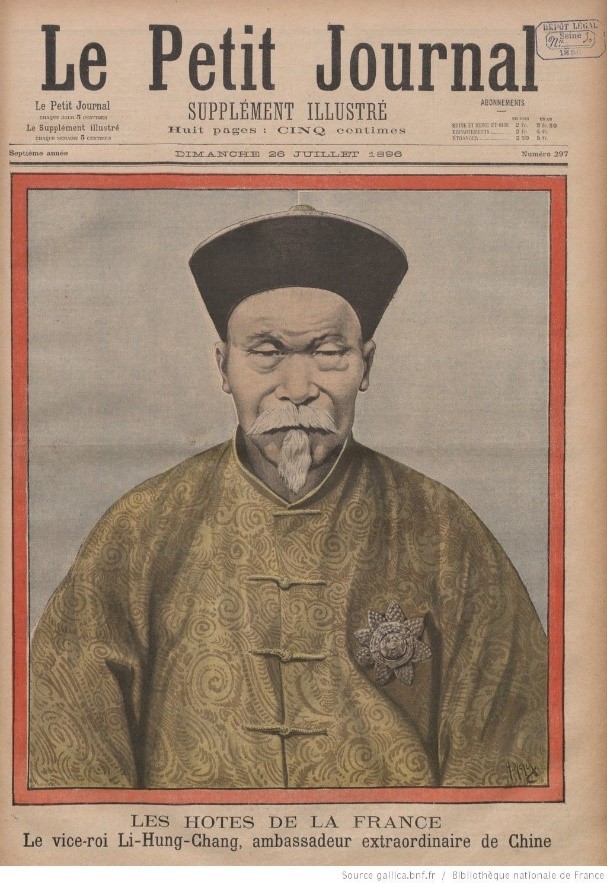 |
Fig. 1 The report about Li Hong Zhang's visit in a French newspaper in 1896
From March 18, 1896, to October 3, over a total of 190 days, 73-year-old Li Hong Zhang visited seven countries, including Russia, Germany, the Netherlands, Belgium, France, the United Kingdom, and the United States. (Fig.1) With his visit, a whirlwind of publicity followed him in Europe and America. The image of the Chinese was positive at that time, and he was given the title of "Honorable Manchu".Li Hong Zhang's visit was initiated by the Sino-Japanese War. After China's defeat in the Sino-Japanese War of 1894-1895, Li went to Japan and signed the Treaty of Shimonoseki (《馬關條約》). During the Sino-Japanese War, Britain supported the Japanese in order to contain Russian influence. Looking back at that time of all the foreign countries' interests in China, Britain realized the greatest economic benefits after the Opium Wars, France relied on the catholic church to strongly influence Chinese people, the U.S. government was reluctant and unwilling to get involved in disputes in other countries under Monroeism - a policy that opposed European colonialism; at that time, Germany did not have any colonies bordering China.
Western countries were not happy when they saw Japan's benefits. First, the Russians, with the support of Germany and France, came forward to ask Japan to return to the Liaodong Peninsula. The Chinese supported the Russians because they needed the Russians to restrict the Japanese. During the Sino-Japanese War, Russia's Tsar Alexander III died and his son Nicholas I became the new Tsar. Nicholas II was preparing to hold a coronation ceremony in May 1896. The Qing court planned to send Wang Zhichun (王之春) from Hubei, as the special envoy for the event, but the Russian minister at that time felt that Wang Zhichun's rank was too low. In the end, the court announced the intention to send Li Hong Zhang as the official and Shao Youlian (邵友濂). They would be accompanied by Li Jingfang (李經方) and Li Jingshi (李經述), the eldest and the second son of Li Hong Zhang. At the same time, Li Hong Zhang was appointed to visit Germany, France, Britain, the United States, and other countries. (Fig. 2)
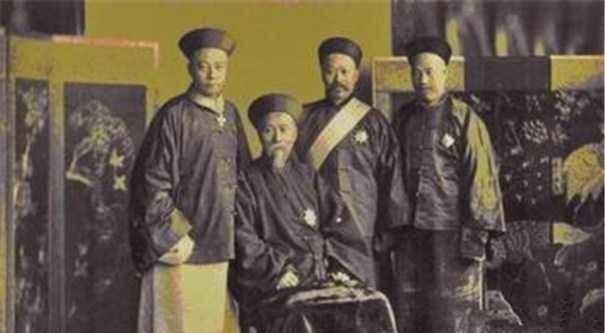 |
Fig. 2 Li Hong Zhang (2nd from left) with his eldest son Li Jingfang (3rd from left),
second son Li Jingshu (1st from left), and third son Li Jingmai (4th from left)
second son Li Jingshu (1st from left), and third son Li Jingmai (4th from left)
There were two very important diplomatic goals for Li Hong Zhang to accomplish at that time. The first one was to unite Russia with the Qing government to restrict Japanese invasion and the second goal was to persuade England from increasing the customs tariff to help pay the huge fines to Japan after the Sino-Japanese War. This was a groundbreaking move at the time, that is, the Qing royal court finally was involved in international politics. At that time, the tariffs were locked at 5% by the foreign countries, but in order to pay for the fines to Japan, the court hoped to increase it by another 5%.
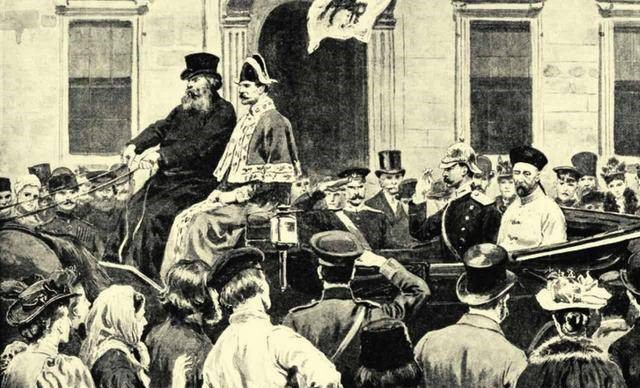 |
Fig. 3 Li Hong Zhang was warmly welcomed when he visited Russia
Li Hong Zhang arrived in Shanghai on March 14, 1896, and set off on the 18th. He took the sea route, arrived in Russia in early May, and arrived in Moscow on the 18th. (Fig. 3) The Russians sent a commissioner to Port Said at the north end of the Suez Canal (in the Mediterranean Sea) to meet Li Hong Zhang in case he visited Germany or other countries ahead of Russia and would be politically influenced by them. Li Hong Zhang received the warmest welcome in Moscow and promised the Russians a way to build roads in a series of secret meetings. Then, the Russians borrowed land owned by China to build the Russian railway to approach Vladivostok, an Eastern port.On June 13, 1896, Li Hong Zhang and his entourage entered Germany. The German Emperor William II personally accompanied Li Hong Zhang to watch military performances. (Fig. 4) A grand reception was given, similar to what happened in Russia.
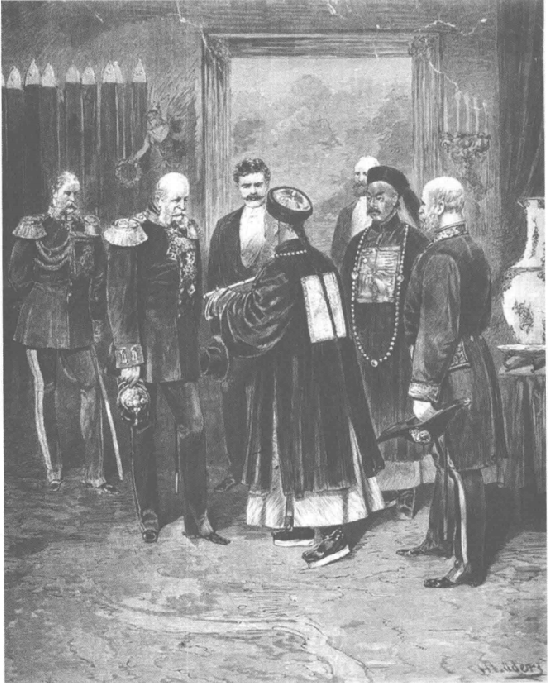 |
Fig. 4 Li Hong Zhang and German Emperor William II
While Li Hong Zhang was visiting Germany, Japanese military politician Yuken Yamaguchi (山縣有朋) was also visiting Germany, but he was not received with as much fanfare.
During Li Hong Zhang's German trip, the reporters and the public were fascinated by his visit to Otto Von Bismarck. (Fig. 5) An American journalist named William Francis Mannix called Li Hong Zhang the Eastern Bismarck. Although this statement may have been controversial, it shows the high opinion many had of Li Hong Zhang.
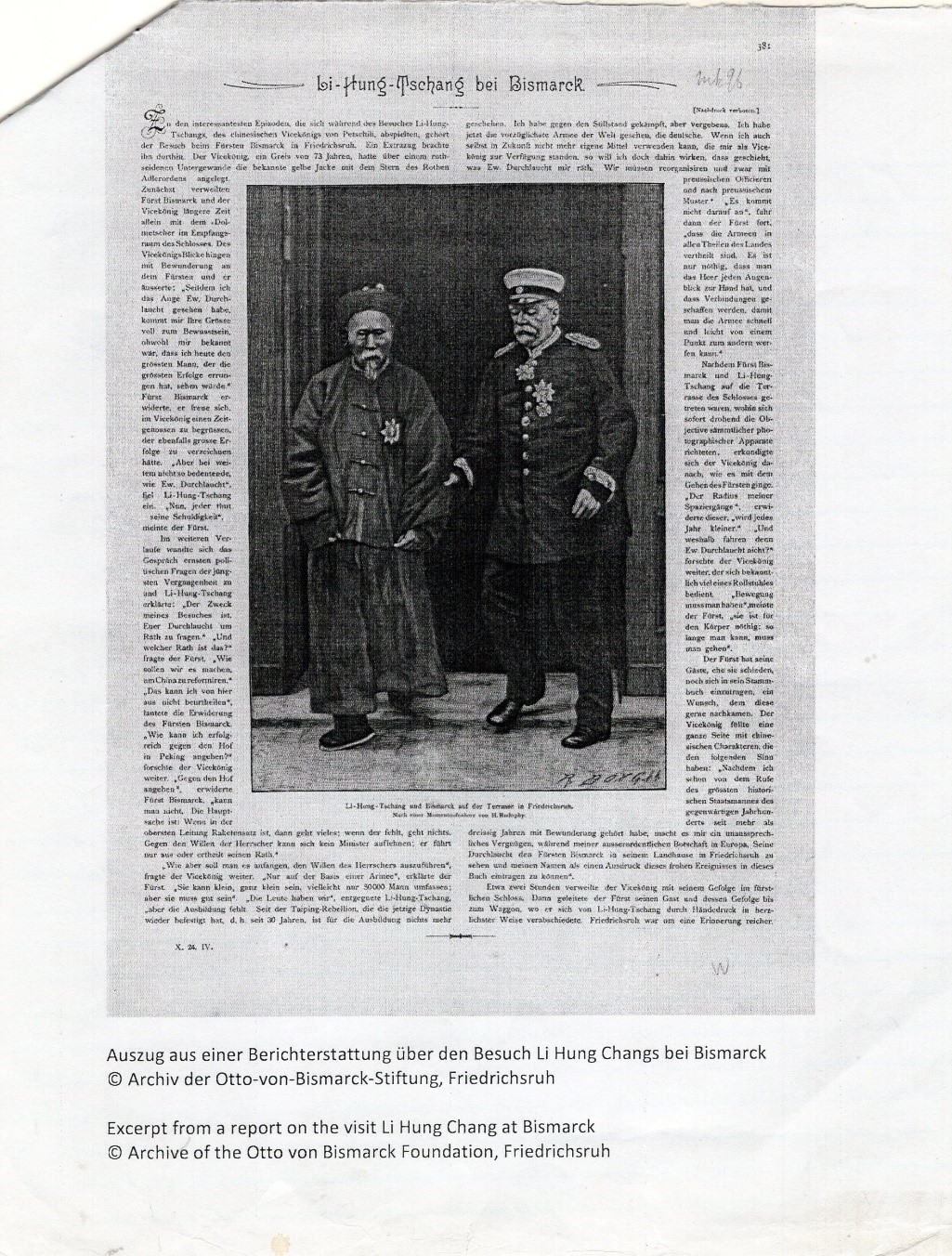 |
Fig. 5 Excerpt from a report on the visit of Li Hong Zhang to Bismarck
© Archive of the Otto von Bismarck Foundation, Friedrichsruch
Li Hong Zhang's meeting with the Prince of Bismarck lasted about two hours. After that, Li Hong Zhang left by carriage.One of the interesting things about Li Hong Zhang's visit to Germany was that they asked him to sing China's national anthem at the banquet. Because there was no Chinese national anthem, he sang a piece of Lu opera, an old opera from Hefei, Anhui, his hometown (which is much older than the Peking opera). In Berlin, he also visited the Charlottenburg Polytechnic and agreed to let Professor Adolf Karl Heinrich Slaby do X-ray experiments for him. At that time, the technology was called R. Ntgen Ray. The film showed he had a bullet in the cheek under the left eye, which was a result of an assassination attempt in Japan.
During the trip, Li Hong Zhang also visited the Krupp Company in Essen. He saw the three small houses built by the company in the exhibition hall, and he was very impressed by how the company had grown from a small iron shop into a large company that had global influence over previous hundred years.
Germany had become a unified country after the Franco-Prussian War.
The Kingdom of Prussia was established during the rule of Napoleon's nephew Louis Napoleon Il. It was also called the Second French Empire.
The Franco-Prussian War established Prussia's status as a European power. It lasted from 1870 to 1871 and paved the way for the unification of Germany. (Fig. 6)
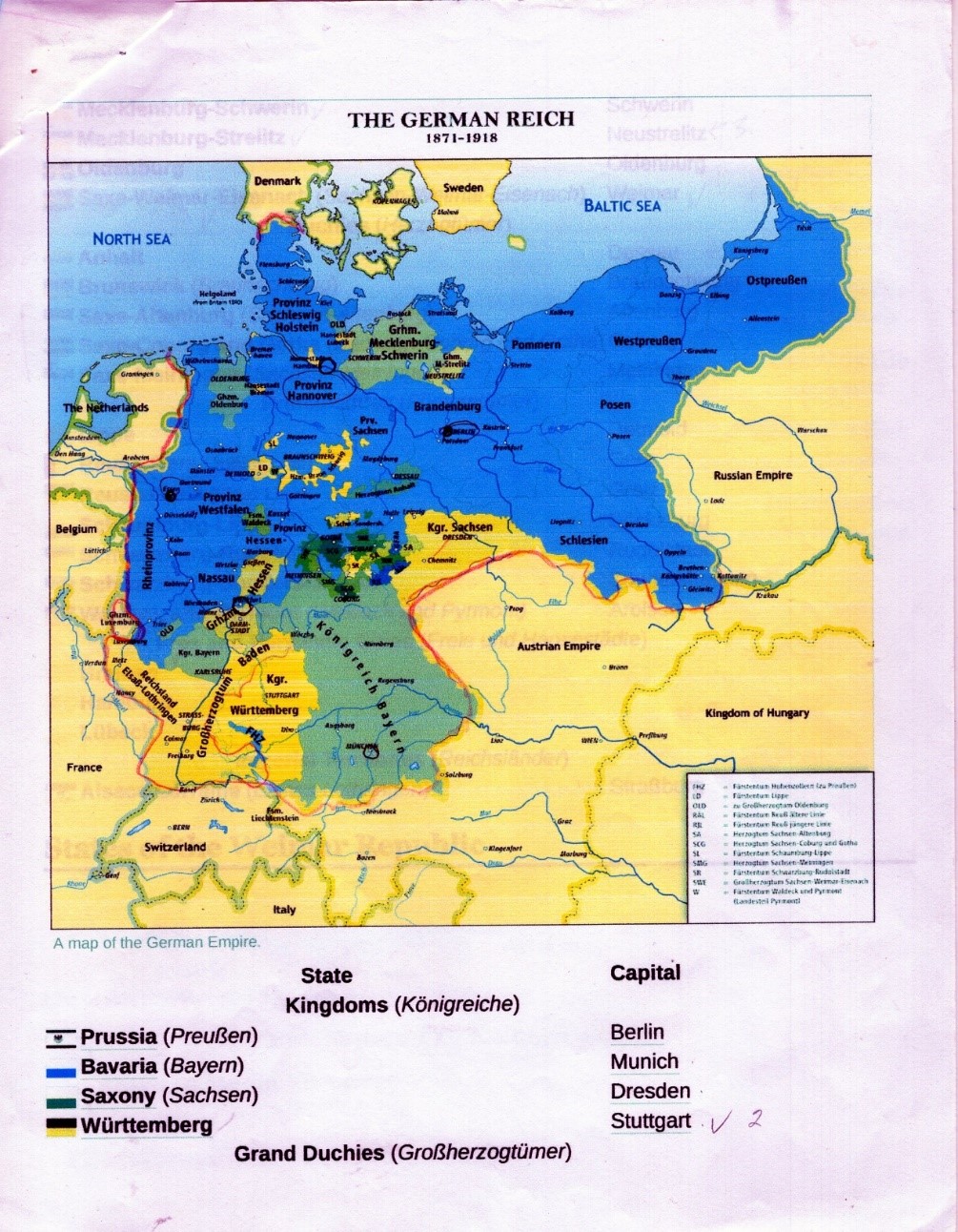 |
Fig. 6 German Empire from 1871 - 1918
Li Hong Zhang always had been suspicious of the French. However, he had been studying Germany since he witnessed the rise of the Germans.After the Russo-Japanese War, Britain was in a neutral position. They could not sell weapons to the Chinese Qing Court, so they moved all arms purchases to Germany.
Later, even the Chinese naval warships were customized by the Germans, including the ironclads Dingyuan and Zhenyuan. (Fig. 7) The artillery on the ship was made by Krupp. The trust and influence towards the Chinese by the Germans has not changed until today.
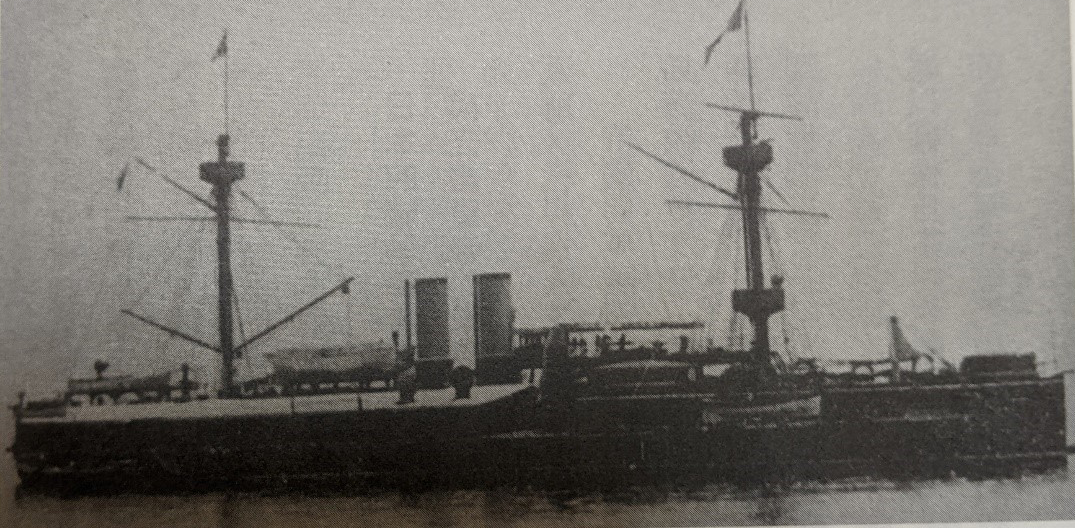 |
Fig. 7 The Ironclad Zhenyuan
When it came to merging Germany, we have to mention the Krupp Company and the city of Essen where the Krupp company is located.
Essen is located in the western Germany. The city of Cologne on the Rhine is just southwest of Essen. Today it is the second largest city in the Ruhr district, which is an area with plenty of resources. There are forests and lakes and also coal mines and iron mines. (Fig. 8)
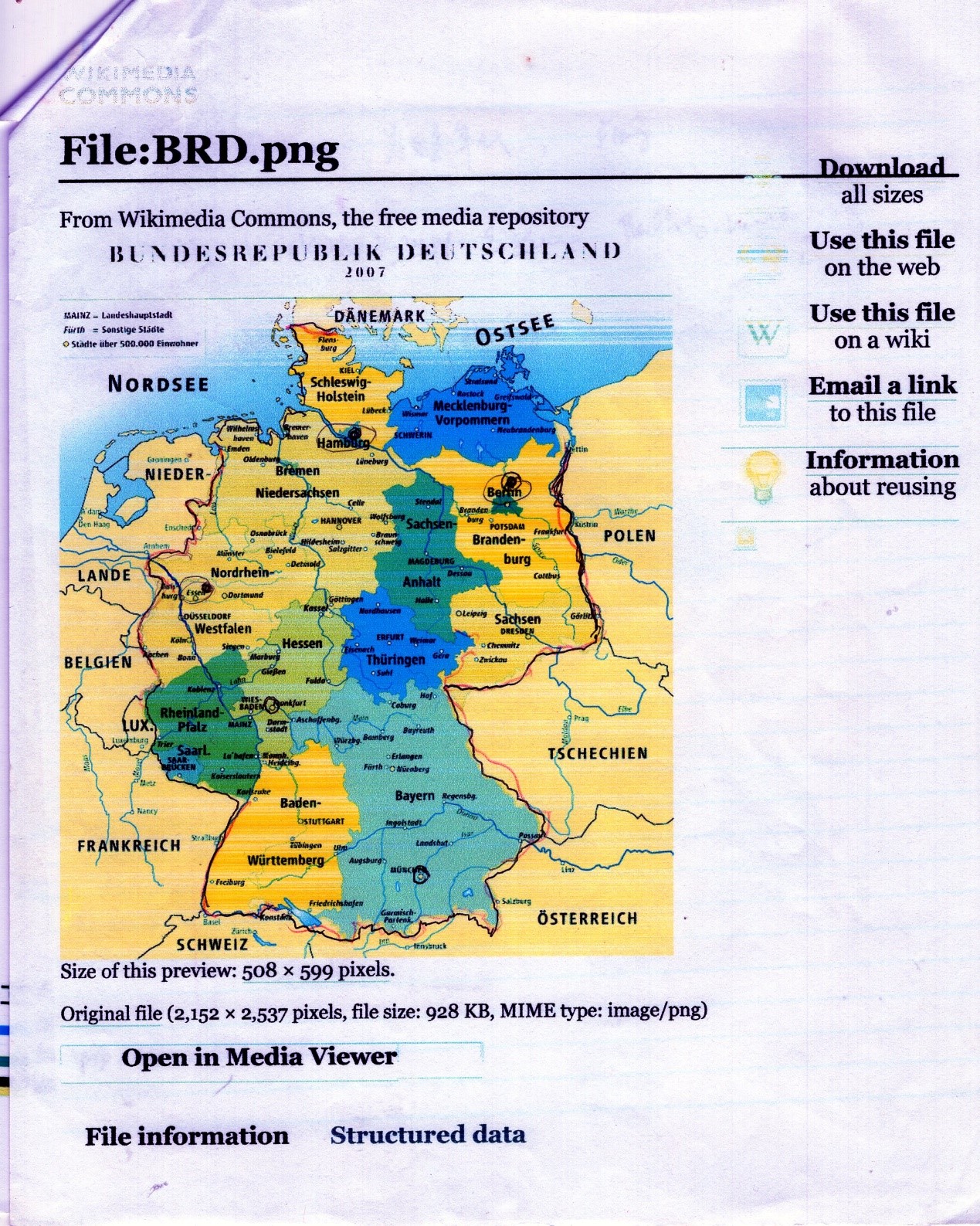 |
Fig. 8 German Republic, 2007
When Krupp (1812-1887) was founded, there were only 4,000 people in the city. Krupp was just an iron shop with three humble houses, doing some small local sales and making some agricultural tools. After developing steel technology, Krupp began building guns and cannons. From steel Krupp gradually became the largest arms manufacturer in Europe. Even the steel used in the original railroads in the United States was also made by Krupp.As early as June 1866, the Qing government sent the first diplomatic mission to Germany. They visited the Krupp Company. At that time, Germany, which had not yet been unified, said that the country had no intention to invade China. In 1871 Li Hong Zhang purchased 328 cannons and artillery made by Krupp. He also invited a German military officer to China to guide the Huai Army and signed a treaty of cooperation. On the Hulishan Fort in Xiamen, Fujian, built in the 20th year of Guangxu in 1894, there is a cannon made by Krupp, and it is still the largest and oldest coastal defense cannon in the world even today (2000 Guinness World Record). (Fig. 9)
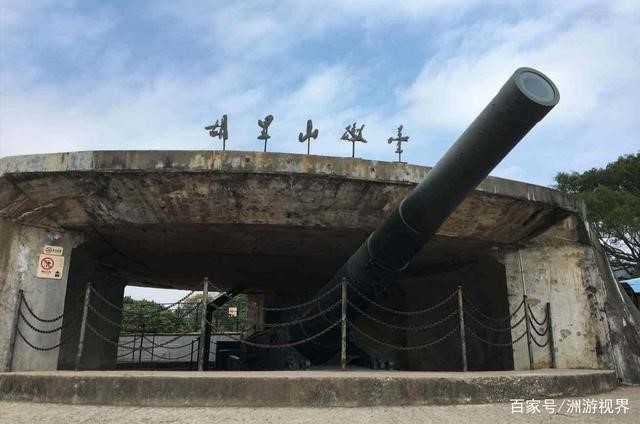 |
Fig. 9 The Krupp cannon at the Hulishan Fort in Xiamen was one of 328 Krupp cannons that Li Hong Zhang purchased in 1871,and it is the oldest and largest 19th-century coastal cannons existing on the original site in the world
In 1876, seven troops from the Huai Army went to Germany to study and in 1880, five more students were selected from the Beiyang Wubei School, which was established at that time. One of those who went to study in Germany was Duan Qiru (段祺瑞).After the signing of the Treaty of Shimonoseki in the Sino-Japanese War, Li Hong Zhang's reputation in the Qing court and among the Chinese people declined greatly. However, because of the requirements of the Russian imperial household, Li Hong Zhang took his eldest son and second son to visit. The main goal of Li Hong Zhang's trip in 1896 was to persuade Russia to limit the influence of Japan. The trip to Germany was not the primary purpose, so he did not bring a gift to Germany. At that time, the new Germany was not as important diplomatically as Britain and Russia in international relations.
Even though he was given a warm welcome initially, Li Hong Zhang's visit did not carry a mission of purchasing arms, which disappointed the Germans which later turned into resentment. This can be seen in Germany's attitude towards China several years after 1896. Kaiser Wilhelm II (Fig. 10) said that Chinese people should not underestimate the Germans even after a thousand years. German newspapers at that time also used negative words (like yellow and junta) to describe Chinese people.
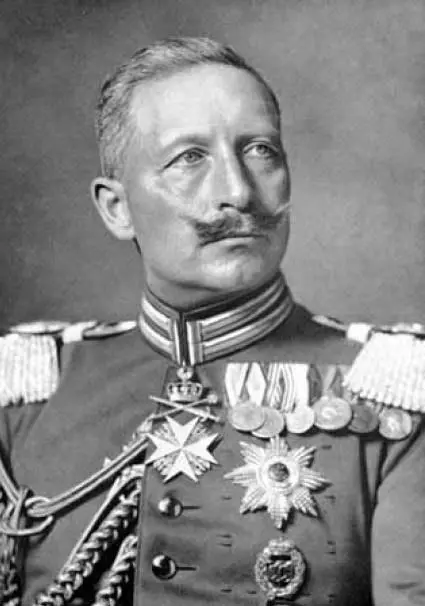 |
Fig. 10 Kaiser Wilhelm II
In 1897, the Germans opposed the nomination of Huang Zunxian (黃遵憲) as ambassador to Germany. After the killing of a missionary in Shandong, a large army was dispatched to seize the Jiaozhou Bay (Fig. 11) for Germany. Two years later, in 1900, German Minister Klemens Freiherr von Kettler was killed in China by a boxer while walking alone in Beijing. This finally caused the outbreak of the famous Boxer Rebellion.
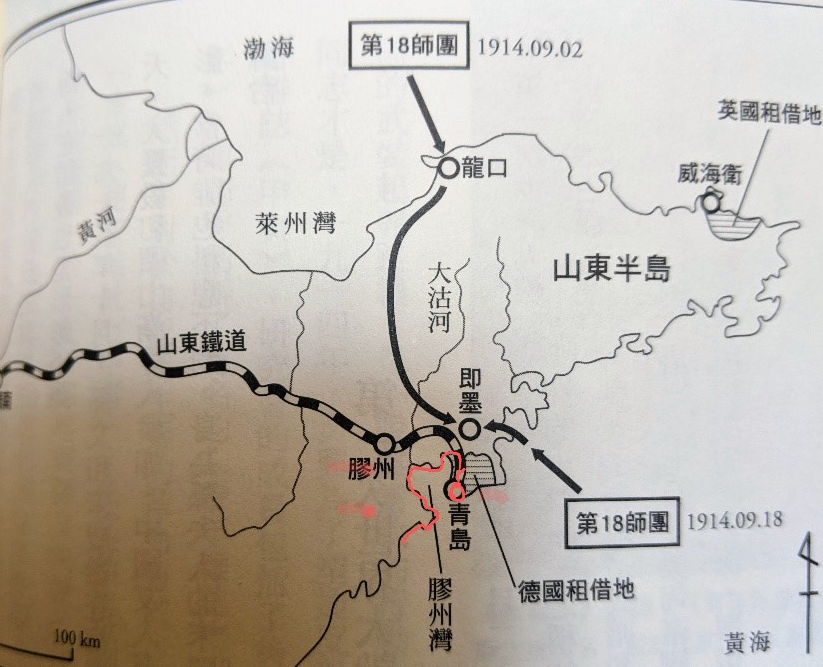 |
Fig. 11 Jiaozhou Bay map
In the Boxer Rebellion, the Germans arrived last, but at that time, the allied forces had already occupied Tianjin and Beijing. They ruined the prime minister's building and slaughtered many civilians. At that time, the coalition forces had decided not to harm the city of Beijing, but the German forces ordered the coalition forces to enter the city for three days. In fact, they robbed for eight days, including the Forbidden City. In order to humiliate the Chinese, they paraded in the Forbidden City. They made many demands when the treaties were signed after the war. (Fig. 12)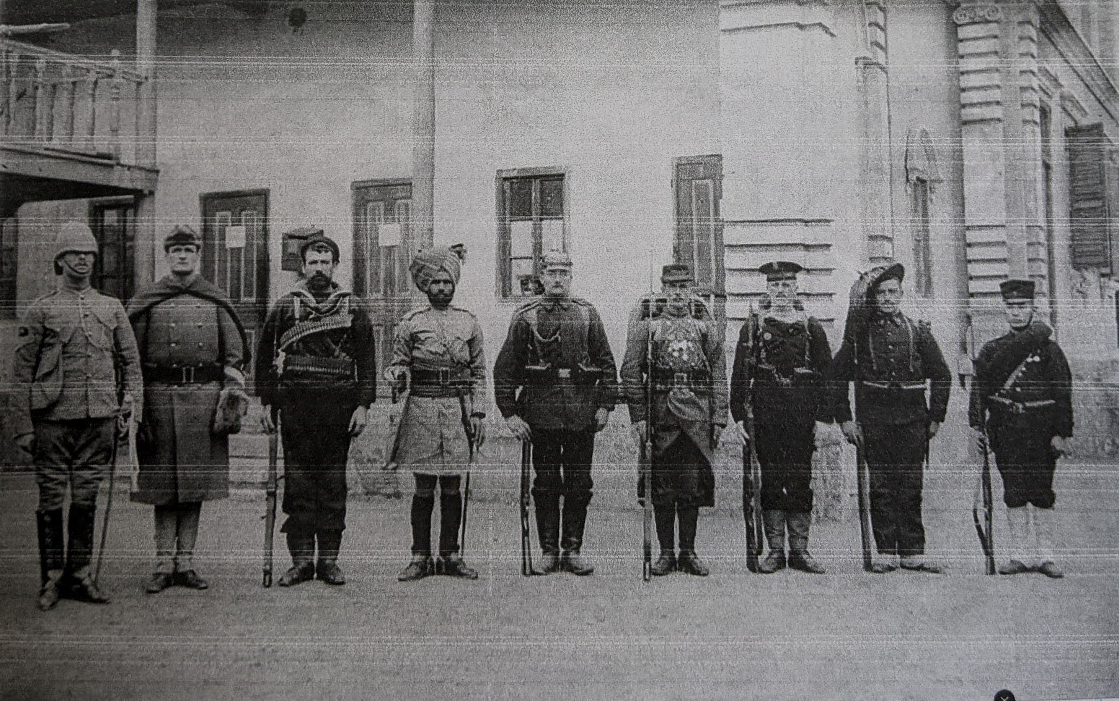 |
Fig. 12 A photo of soldiers from the Eight-Nation Alliance in 1900 in Peking (Beijing). The photograph shows soldiers of the Eight-National Alliance in 1900. From left to right: Britain, United States, Australia, British India, Germany, France, Austria-Hungary, Italy, and Japan. It is worth noting that there were soldiers from more than eight countries, ranked in white priority (the top three are Britain, the United States, and Australia).
The grudges between China and Germany finally died out after the end of the Second World War, but the origins can be traced to the time of Li Hong Zhang and his Huai Army.
However, the two countries have always had a trade relationship. Before the Second World War, in order to build forts along the coast along the Yangtze River port, cement was imported from Germany. Today, one can see the influence of the Germans in the Chinese army such as the way they march during formal military parades.
In the modern history of China, the first student movement that happened on May 4th, 1919 was inextricably related to Germany and Japan.
During the First World War, Japan secretly contributed funds to help Beiyang warlord, Li Hong Zhang's student, Duan Qirui to build an army that participated in the First World War in Europe. The war ended in 1918 and by 1919 defeated Germany needed to return all the land occupied in Jiaozhou Bay to China. However, at that time, China did not have a stable government. Also, during World War I, Japan and Yuan Shi Kai, who was emperor from 1915 to 1916, signed the 21 Demands. These allowed Japan to take over the property of Germany in Jiaozhou Bay.
This action led to the anger of the young students in China who participated in the May 4th Movement that influenced China's later generations. The author's father, Mr. He Mengwu (何孟吾, also known as Ho Haoruo 何皓若), was a student at Tsinghua University. He was supposed to graduate in June 1919. Instead, he led Tsinghua students to march. Afterward, the school did not let him graduate in June. It was not until the spring of the next year that he was given a diploma and was able to go to the United States for further study.
The Germans' interests in China's land ended after Japan's actions during World War I, but their influence on China has not disappeared.
After Li Hong Zhang returned to China, he did not hold the same position in the Qing court. Although he admired Germany, he could no longer influence the policies of the Qing court. But it is not difficult for us to see the respect of the world for emerging Germany by the respect of the mayor of Essen, where the Krupp Company was located at the time.
This article introduces the medals worn by the mayor of Essen and the certificates issued to him by various countries. The mayor was named Gustav Poser. He was born to a prominent family in Europe and had considerable influence on the local area.
Mr. Poser's medals and documents were part of Draskovic's collection. ( Fig. 13-Fig. 20) These items were purchased at a European auction more than ten years ago. Based on these medals, it is not difficult to see Germany's influence in the late 19th century. Many foreign states were afraid of Krupp and its powerful military capabilities.
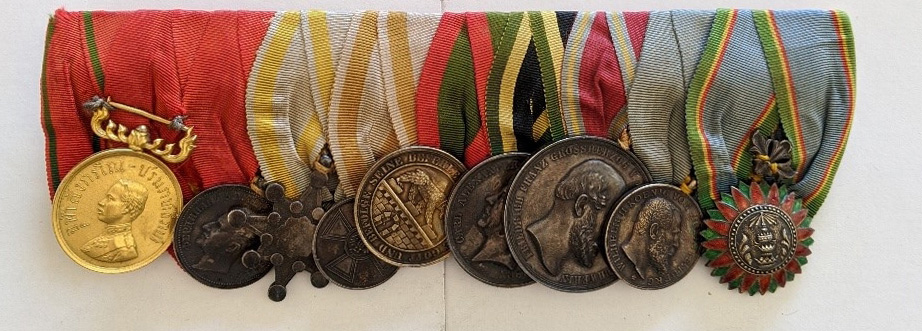 |
Fig. 13 Medals in the Poser collection
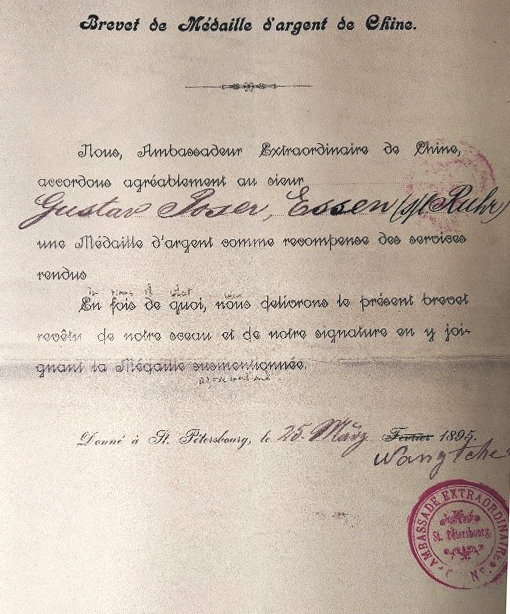 |
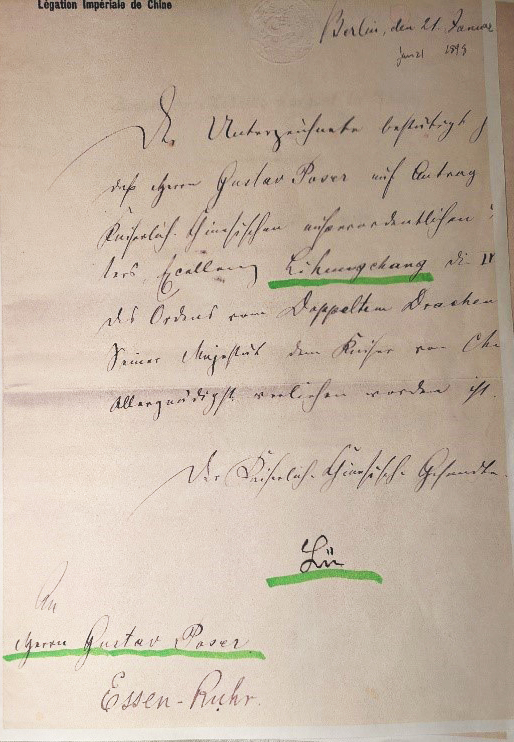 |
Fig. 14 Two documents in the Poser collection
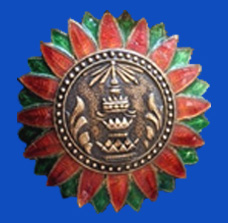 |
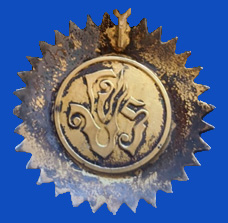 |
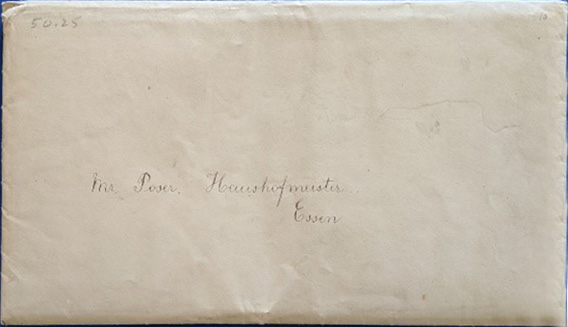 |
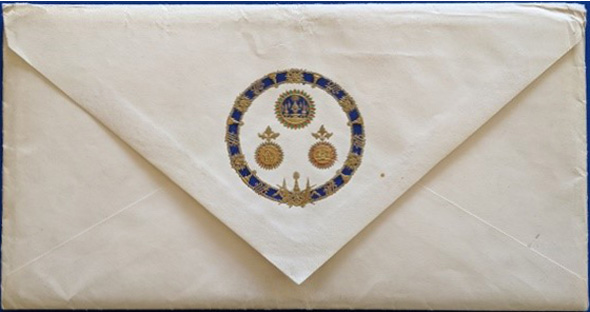 |
Fig. 15 The Crown of Siam Order (the first Order from the right in Fig. 13) and relevant documentation
Fig. 17 The Grand Duke of Mecklenburg-Schwerin Order (the third Order from the right in Fig. 13)
and relevant documentations
Fig. 18 The Grand Duke of Saxe-Weimar-Eisenach Order of East Germany
(the fourth Order from the right in Fig. 13) and relevant documentation
Fig. 19 The Order of Saxony-Anhalt in the middle of Germany
(the fifth Order from the right in Fig. 13) and relevant documentation
Fig. 20 The Japanese Order (the third Order from the left in Fig. 13) and relevant documentation
Two of these documents were issued by the Chinese Embassy. The first one was issued by Wang Zhichun, the ambassador to Russia, in St. Petersburg in 1895. It is dated May 25, 1895.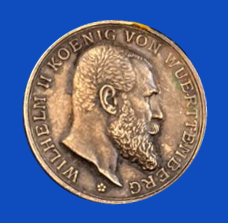 |
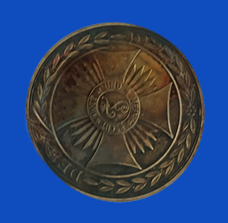 |
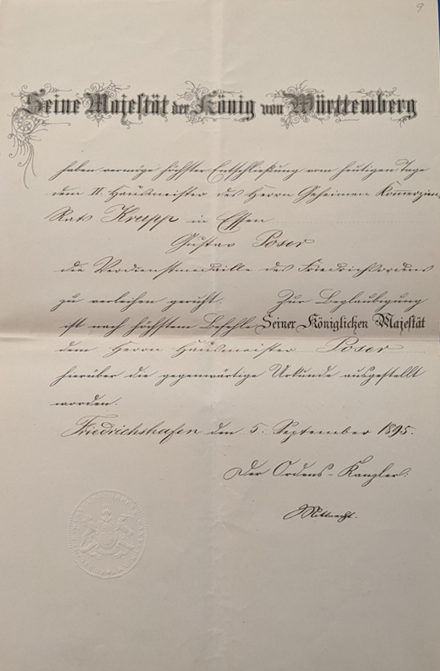 |
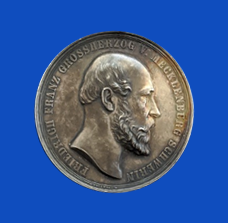 |
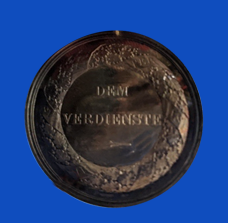 |
and relevant documentations
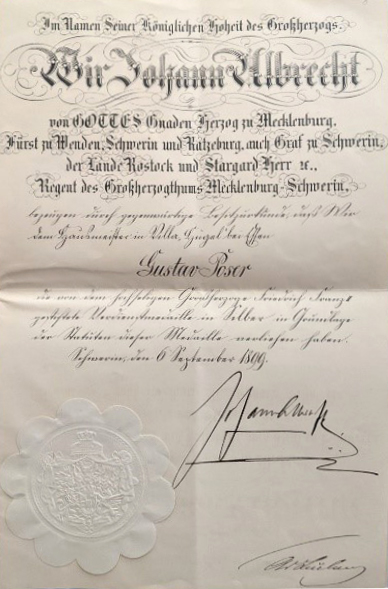 |
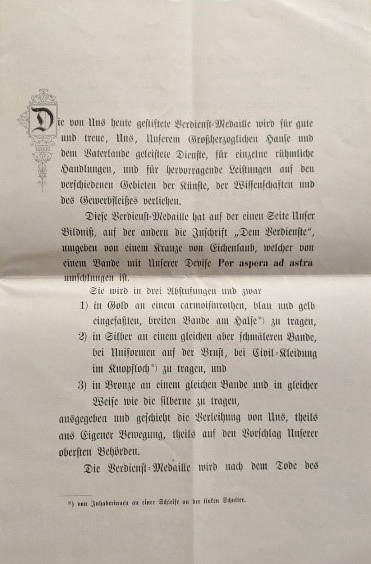 |
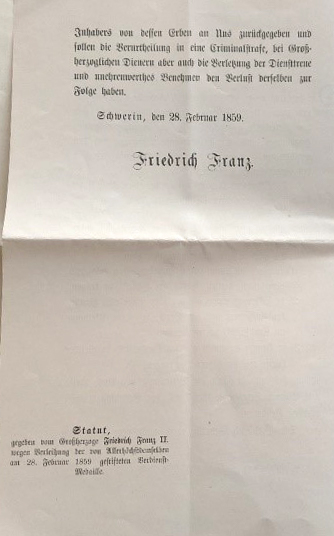 |
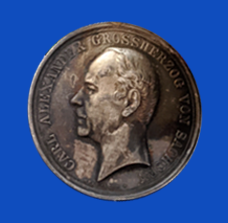 |
(the fourth Order from the right in Fig. 13) and relevant documentation
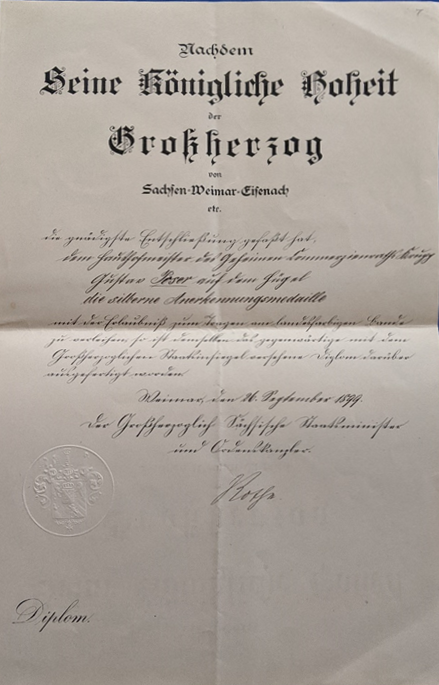 |
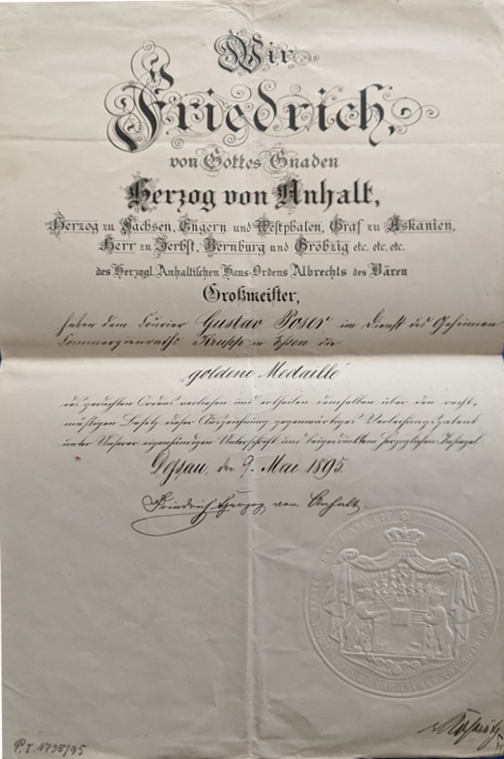 |
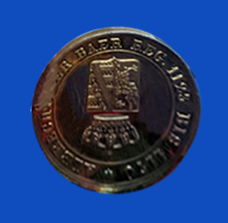 |
(the fifth Order from the right in Fig. 13) and relevant documentation
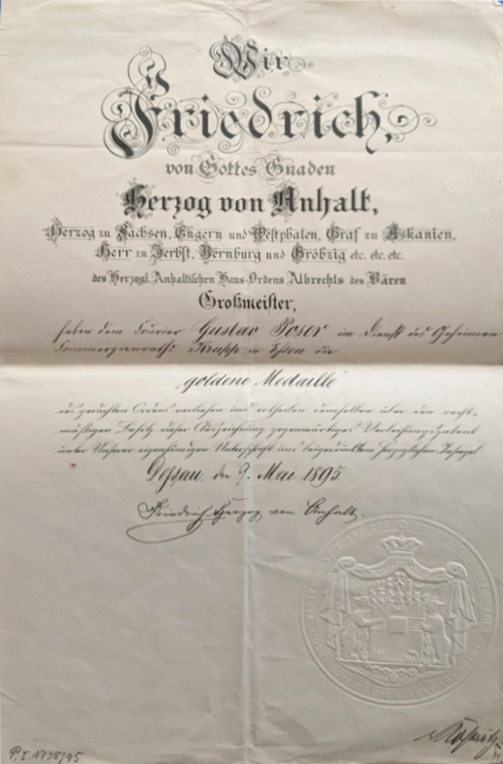 |
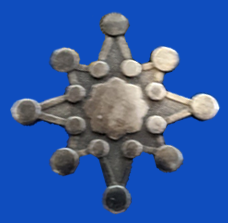 |
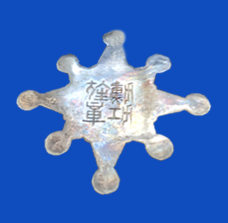 |
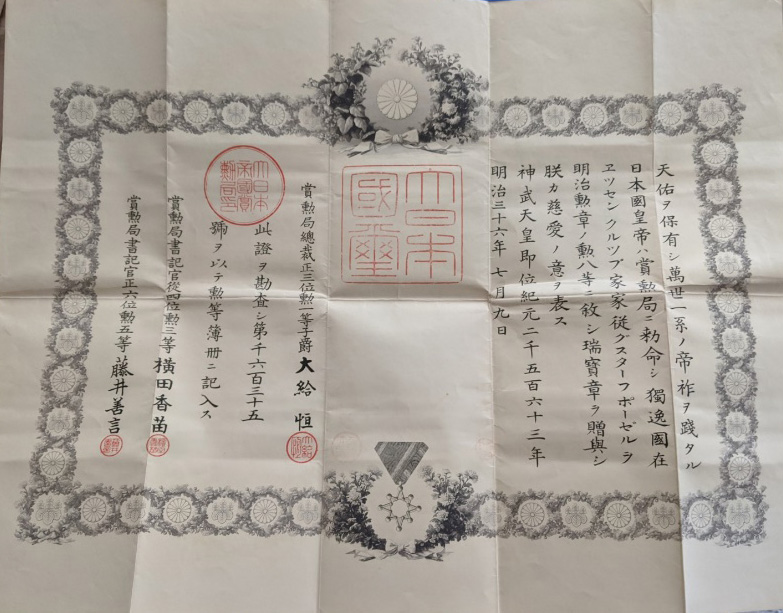 |
As the ambassador to Russia, Wang Zhichun did not seem to have much authority. He had less influence than ambassadors have today. Many of his duties were ceremonial and some did not see him as the representative of the Qing court. His lack of influence can be seen in Russia's resolute opposition to his presentation at the coronation ceremony of Nicholas II in 1896. This letter and the medal also show the relationship between the Krupp in Essen and the Qing court. The medal was obviously issued before Li Hong Zhang's visit in 1896. At that time, the Qing court did not let go of the dignity of his own celestial dynasty. This is just like the eighth-level second-class medal issued by Japan at that time. Levels of government were very important. In ancient China, officials of the imperial court could not directly negotiate with officials below the county or city level. Sometimes, if necessary, they would upgrade some counties and cities to municipalities directly under the central government, and then the parties could negotiate.
The other document was issued by Luo Fenglu (羅豐祿) of the Chinese Embassy in Berlin on January 21, 1898. It is mentioned in the article that after Li Hong Zhang's visit in 1896, the Qing court decided to present the fourth-class Order of the Double Dragon Medal in 1898 to Mr. Poser. (Fig. 21)
Luo Fenglu was a native of Furan County, Fujian. He graduated from Fuzhou Shipping Academy. After studying in England in 1877, he entered the British Embassy as an interpreter. Later, he worked as an interpreter for the Embassy in Germany. After returning to China in February 1880, he became Li Hong Zhang's English secretary. In 1896, he was awarded the fourth-grade officer in Beijing as the ambassador of Britain, Belgium, and Italy. The fourth-class Order of the Double Dragon Medal was only issued to Mr. Poser two years after Li Hong Zhang's visit to Germany. It was probably caused by the Germans' disrespectful and unfriendly attitude towards China after Li Hong Zhang's visit. They hoped to improve international relations at that time by raising the ranks of Mr. Luo Fenglu and then the court could issue a higher-level medal to Mr. Poser. Because the Manchu government did not produce fourth-class medals at that time, they used third-class medals.
After the Europeans returned from the crusaders, they established the Lutheran Church in Nuremberg in Germany. The church awarded medals to returning soldiers. Wearing medals became a symbol of fashion and social status. The medal is usually worn on the chest on the left. It can be worn on the right side of the chest if the medal was awarded to your father or brother. Many foreigners came to work in China at the end of the Qing dynasty. They all hoped to have Chinese medals to wear after returning home. However, at the time, the Qing did not have such a tradition. Some merit medals made by local officials were used in the beginning. (Fig. 22) The Qing court eventually began to have the idea of making orders. The Order of Double Dragon Medal was created. It was generally believed that the first version was made in Austria and later in Russia. The original form was either square or rectangular, very different from that of the European medal. Europeans sometimes added a star-like metal under the original medal after they returned home. Some large round-shaped medals were later made by Russian jewelry shops. The second version was probably made around 1896 for Li Hong Zhang's visit. This was seen in the pictures of the official records of the members wearing the Double Dragon Medals but it was not clear who made them at the time and there are no detailed records of the grades and the jewels used.
There were no Chinese medals in the Draskovic collection when we purchased all the documents and medals in Europe. They might have been separated during the auction or even before that. In our collection, there is no new fourth-class Double Dragon Order, so only third-class orders were awarded. It is generally believed that the final unified production was done after 1906 (Guangxu 33). With the decline of the Qing dynasty (1911), the Order of the Double Dragon Medal has also become a historical term.
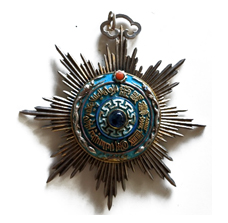 |
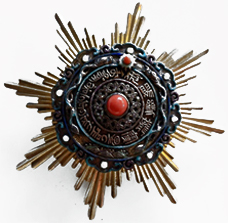 |
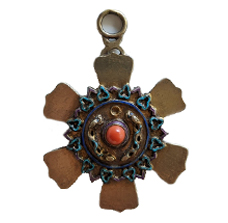 |
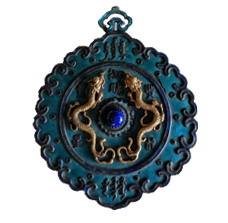 |
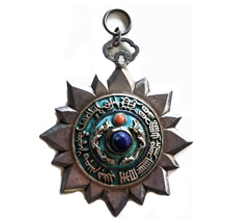 |
Fig. 21 Orders of the Double Dragon Medal
In this article, we are showing a couple of the medals in our collection, a third-class and a fourth or fifth-class Double Dragon Medal. It is obvious that the fourth or the fifth-class medal is very different from that of the third and is believed only made after 1906. The medal given to Mr. Poser in 1898 could not be the form as those made after 1906. It is believed that a third-class was used instead. It is unfortunate that we have never seen any official document with the Order of Double Dragon Medal in our collection. In this article, one can see that the granting of western medals was always accompanied by relevant official documents. Although the two letters sent by the embassies mentioned in this article had official seals and were signed by Wang Zhichun and by Luo Fenglu. The paper used also had a good watermark. It seemed that it did not have the same standard as other countries including Japan and Thailand, which only confirms the lack of experience of the Qing court at the beginning of diplomacy at that time.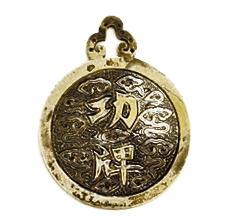 |
Fig. 22 Chinese merit medal
In the Chinese lunar calendar, 2021 is the year of "Xin Chou" and it is the two Jiazi (a Jiazi is 60 years) after the signing of the Treaty of Xin Chou after the Boxer Rebellion was defeated by the Eight-Nation Coalition forces in 1900. The compensation was that every Chinese had to pay one silver dollar and every city, big or small, had to post the notice "Don't be Rude to Foreigners". It is not until today that we Chinese can stand on the same level as foreigners in diplomacy, which is much from the time when Li Hong Zhang visited other countries.
Looking back at Mr. Li Hong Zhang's life, his decisions on the policies of the end of the Qing dynasty, especially in foreign policy, are quite influential. Li Hong Zhang brought China to the international stage. Huang Zunxian, Wang Zhichun, Duan Qirui, and Luo Fenglu we have mentioned in this article were all students he brought out. These people have directly or indirectly affected China's administration and diplomacy for decades after him.
Mr. Li Hong Zhang's achievements were from his talents. His open personality and continuous learning attitude also helped him to in his career. According to the Chinese, he is a man of both civil and military skills and a scholar. He was a Renaissance man of his time.
About the Author
William Ho, one of the authors of this article, is a well-known scholar and was a senior scientist at the Rockwell International Science Center in the United States, where he was responsible for several projects, including research on aerospace materials. Ms. Chinan Fan, Ph.D. in Chemistry, was involved in the development of leukemia drugs. The 13th issue of the Journal of East Asian Numismatics contains Li Hung Chang: His Visit to America on His Grand World Tour, the 15th issue Charles Tong Sing and the Arctic Expedition of the USS Jeannette, and the 18th issue the Macau Document, all of which are from the Ho's. Among these articles, the article Macau Document won the first Howard Franklin Bowker Coin Literary Award.
Wang Zuoshi, one of the pioneers of the modern democratic movement in China, one of the leaders of the May Fourth Movement, and one of the famous “Seven Gentlemen”, had this to say about General Ho Haoruo:“It was almost dusk when Luo Longji and Ho Haoruo got the news that students from various schools in the city held a demonstration and set fire to Zhao's building and many students were arrested, but they still rushed into the city to inquire further into the details of the situation. At that time, after learning that the schools had decided to strike in order to rescue the arrested students, they rushed back to school overnight and had an emergency meeting the next day, deciding to take concerted action with the schools. As a student leader, Ho Ruohao walked at the forefront of the demonstration procession and became a brave May Fourth Movement fighter.”
Later, Ho Ruohao received a scholarship to study at Stanford University in the U.S. In 1923, he transferred to the University of Wisconsin, where he received his doctorate in philosophy. After that, he transferred to the Norwich University – The Military College of Vermont to study cavalry and graduated in 1927. After graduating from the Norwich and returning to China, he joined the National Revolutionary Army, and served as a political instructor of the 4th class of the Republic of China Military Academy. Later, he served as the chief of staff of the 46th Army and the commander of the 59th Regiment of the 10th Division. Between 1935 and 1937, Ho served as a member of the Hunan Provincial Government and the Director of Finance of the Henan Provincial Government. After the outbreak of the War of Resistance Against Japanese Aggression, he was ordered to investigate the finances of seven provinces, namely Hunan, Hubei, Guangdong, Guangxi, Sichuan, Yunnan, and Guizhou, and went to Chongqing in March 1939. In January 1940, he became the Director of the Third Department of the Political Department of the Military Council of the National Government and the Director of the Propaganda Division of the Three Ministers' Youth. He was the president of the Central Daily News and the deputy secretary general of the Economic Conference. He became the director of the Bureau of Materials in early 1942. From January 1943, he served as Deputy Secretary General of the National General Mobilization Committee, Deputy Director of the Political Department of the Military Commission, Standing Officer of the Central Committee of the Trinitarian Youth League, and Director of the Foreign Affairs Bureau of the Military Commission. In May 1945, he was elected as a member of the 6th Central Executive Committee of the Kuomintang. After the victory of the Anti-Japanese War, he served as the Secretary General of the Political Affairs Committee of the Suijing Area of the Executive Council. In 1948, he became a member of the Standing Committee of the Kuomintang Central Committee and then a member of the Executive Council. In December of the same year, he went to work in the United States as an advisor to the United Nations Mission to China.
In addition, General Ho held the position of Director of the Foreign Affairs Bureau of the Military Commission of the National Government and was responsible for the training of military interpreters in the Chongqing area. During the war period, Chongqing was the center of politics, economy, culture, and especially the military of China, and played a huge role in the recruitment and training of military interpreters. Including General Ho, key officials of the National Government such as Chiang Kai-shek, Chen Cheng, and Shang Zhen, as well as Admiral Wei Demai, commander of the U.S. Army in the Chinese Theater, spoke at the interpreter training course. On February 2, 1945, at the banquet for the graduating teachers and students, General Ho Ruohao and General Wei Demai gave a speech, wishing that the “Chinese Way” would always maintain world peace.
The Ho family was a family of scholars and lived on the same street as Chairman Mao Zedong's family. General Ho objected to the issuance of gold yuan notes when the policy was implemented from August 1948 to July 1949, so his promotion to Minister of Finance was opposed by Mrs. Chiang. He was instead sent to New York as China's representative to the UN Security Council from 1949 to 1960. Mr. Qi Baishi, a master of Chinese painting, was also a good friend of the Ho family and gave a painting to General Ho Ruohao. It is worth mentioning that Chairman Mao, Master Qi Baishi, and General Ho all came from Xiangtan, Hunan Province.
General Ho Ruohao is the alumni of General Sun Liren, one of the ten most famous generals of the national army against Japan. They have worked together and have a close personal relationship. General Sun even accepted General Ho's son, Mr. William Ho, as his adopted son.
Ho Ruohao, the author William Ho's father, once worked in multiple universities and brought out a generation of domestic financial talents. His way of teaching made the knowledge easy for students to understand, witty and inspiring. After returning to China in his early years, he referred to the policies of the United States during the Great Depression of the 1930s and established a distribution system domestically before World War II, which maintained the stability of the economy in China for decades before and after the war. Throughout his life, he wrote numerous books on finance and economics. In his later years, he served as the dean of the National Defense Research Institute and trained officials. He published his work Our Responsibility in 1922. Taking historical trends as the background, he inspired a generation of young people to take the country and nation as their own responsibility by broadening their horizons and inheriting from the past. Mr. Ho enjoyed both literary and martial skills, contributing to the country and nation throughout his life, and he can truly serve as a model for generations to come.
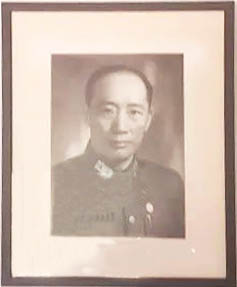 |
The photo of General Ho Ruohao in Mr. William Ho's home
William Ho comes from a distinguished family background. His father, General Ho Haoruo mentioned in the article, was born in 1899. In 1913, Ho Haoruo entered the Tsinghua Academy in Beijing and became a classmate of Wen Yiduo, an early leader of the Chinese Democratic League and a representative poet and scholar, Sa Bendong, the first academician of the Academia Sinica, and Luo Longji, a former member of the State Council, a member of the Standing Committee of the National Committee of the Chinese People's Political Consultative Conference and a member of the first National People's Congress. During the May Fourth Movement, Mr. Ho led Tsinghua to launch a student movement, for which he was punished with a delay in graduation.Wang Zuoshi, one of the pioneers of the modern democratic movement in China, one of the leaders of the May Fourth Movement, and one of the famous “Seven Gentlemen”, had this to say about General Ho Haoruo:“It was almost dusk when Luo Longji and Ho Haoruo got the news that students from various schools in the city held a demonstration and set fire to Zhao's building and many students were arrested, but they still rushed into the city to inquire further into the details of the situation. At that time, after learning that the schools had decided to strike in order to rescue the arrested students, they rushed back to school overnight and had an emergency meeting the next day, deciding to take concerted action with the schools. As a student leader, Ho Ruohao walked at the forefront of the demonstration procession and became a brave May Fourth Movement fighter.”
Later, Ho Ruohao received a scholarship to study at Stanford University in the U.S. In 1923, he transferred to the University of Wisconsin, where he received his doctorate in philosophy. After that, he transferred to the Norwich University – The Military College of Vermont to study cavalry and graduated in 1927. After graduating from the Norwich and returning to China, he joined the National Revolutionary Army, and served as a political instructor of the 4th class of the Republic of China Military Academy. Later, he served as the chief of staff of the 46th Army and the commander of the 59th Regiment of the 10th Division. Between 1935 and 1937, Ho served as a member of the Hunan Provincial Government and the Director of Finance of the Henan Provincial Government. After the outbreak of the War of Resistance Against Japanese Aggression, he was ordered to investigate the finances of seven provinces, namely Hunan, Hubei, Guangdong, Guangxi, Sichuan, Yunnan, and Guizhou, and went to Chongqing in March 1939. In January 1940, he became the Director of the Third Department of the Political Department of the Military Council of the National Government and the Director of the Propaganda Division of the Three Ministers' Youth. He was the president of the Central Daily News and the deputy secretary general of the Economic Conference. He became the director of the Bureau of Materials in early 1942. From January 1943, he served as Deputy Secretary General of the National General Mobilization Committee, Deputy Director of the Political Department of the Military Commission, Standing Officer of the Central Committee of the Trinitarian Youth League, and Director of the Foreign Affairs Bureau of the Military Commission. In May 1945, he was elected as a member of the 6th Central Executive Committee of the Kuomintang. After the victory of the Anti-Japanese War, he served as the Secretary General of the Political Affairs Committee of the Suijing Area of the Executive Council. In 1948, he became a member of the Standing Committee of the Kuomintang Central Committee and then a member of the Executive Council. In December of the same year, he went to work in the United States as an advisor to the United Nations Mission to China.
In addition, General Ho held the position of Director of the Foreign Affairs Bureau of the Military Commission of the National Government and was responsible for the training of military interpreters in the Chongqing area. During the war period, Chongqing was the center of politics, economy, culture, and especially the military of China, and played a huge role in the recruitment and training of military interpreters. Including General Ho, key officials of the National Government such as Chiang Kai-shek, Chen Cheng, and Shang Zhen, as well as Admiral Wei Demai, commander of the U.S. Army in the Chinese Theater, spoke at the interpreter training course. On February 2, 1945, at the banquet for the graduating teachers and students, General Ho Ruohao and General Wei Demai gave a speech, wishing that the “Chinese Way” would always maintain world peace.
The Ho family was a family of scholars and lived on the same street as Chairman Mao Zedong's family. General Ho objected to the issuance of gold yuan notes when the policy was implemented from August 1948 to July 1949, so his promotion to Minister of Finance was opposed by Mrs. Chiang. He was instead sent to New York as China's representative to the UN Security Council from 1949 to 1960. Mr. Qi Baishi, a master of Chinese painting, was also a good friend of the Ho family and gave a painting to General Ho Ruohao. It is worth mentioning that Chairman Mao, Master Qi Baishi, and General Ho all came from Xiangtan, Hunan Province.
General Ho Ruohao is the alumni of General Sun Liren, one of the ten most famous generals of the national army against Japan. They have worked together and have a close personal relationship. General Sun even accepted General Ho's son, Mr. William Ho, as his adopted son.
Ho Ruohao, the author William Ho's father, once worked in multiple universities and brought out a generation of domestic financial talents. His way of teaching made the knowledge easy for students to understand, witty and inspiring. After returning to China in his early years, he referred to the policies of the United States during the Great Depression of the 1930s and established a distribution system domestically before World War II, which maintained the stability of the economy in China for decades before and after the war. Throughout his life, he wrote numerous books on finance and economics. In his later years, he served as the dean of the National Defense Research Institute and trained officials. He published his work Our Responsibility in 1922. Taking historical trends as the background, he inspired a generation of young people to take the country and nation as their own responsibility by broadening their horizons and inheriting from the past. Mr. Ho enjoyed both literary and martial skills, contributing to the country and nation throughout his life, and he can truly serve as a model for generations to come.
